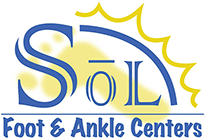Dealing with a foot pain can be a confusing proposition!
You want to know the proper steps of how to help your foot problem, but you don’t want to make your problem worse. You’re deluged by over-the-counter products, information from well-meaning friends, family and co-workers, and of course, the dreaded Google search can make things even more confusing.
At Sol Foot & Ankle Centers we feel your foot pain. So, for the next couple of articles we’ve put together two lists. The first list is simple things that you can almost always safely do to help alleviate some common foot problems. The second list is things that can be harmful and that you should almost never do on your own.
These recommendations are only for minor issues and if you’re not seeing immediate improvement, get help! Don’t let a potentially serious issue get out of hand.
Remember, nothing takes the place of seeing your podiatrist if you have a foot problems!
5 Healthly Foot Tips & Recommendations
1. Stretch Often - Minor aches and pains in the legs and feet can often be alleviated by simply stretching out the affected area. The most valuable stretches for foot problems are usually calf stretches. Gentle stretching of the calf muscles is good for muscle strains, cramps, Achilles tendon pain, heel and arch pain.
most valuable stretches for foot problems are usually calf stretches. Gentle stretching of the calf muscles is good for muscle strains, cramps, Achilles tendon pain, heel and arch pain.
Download the calf stretch exercises remember to stretch both with a straight knee and with a bent knee.
2. Buy New Shoes - Shoes are often the cause of many foot and ankle problems. Foot pain can be caused by shoes that are worn out, shoes that do not fit properly, or shoes that aggravate a pre-existing condition such as bunions, hammertoes or flat feet. Getting into a new pair of shoes can sometimes provide immediate relief. If not, then at least you've got another pair of shoes!
One of Dr. Graves' favorite adages: If you're not sure if you need new shoes, go try on a pair. When you feel the difference, you'll know.
3. Use Bunion or Corn pads - Using over-the-counter donut-shaped pads can be an effective way to alleviate pain caused by pressure at various areas on the foot. These pads are usually called "bunion pads" or "corn pads" (the only difference is the site of the donut). They can decrease shoe pressure on the toes, sides of the foot or back of the heel and sometimes even help with pressure on the bottom of the heel or ball of the foot. Of course it's always a better idea not to wear shoes that hurt your feet, but in a pinch the pads are a nice idea when you "just have to wear" those fancy shoes for a special occasion. But please remember to avoid the medicated pads!
4. Wear Heel lifts - Raising the heel of the foot can be helpful for a variety of foot problems, including plantar fasciitis, heel pain, arch pain, Achilles tendon issues and even calf pain. Raising the heel of the foot decreases the tension in the calf muscles and Achilles tendon but also decreases the forces that cause flattening of the arch. There are a variety of over-the-counter heel products available that you can place either on top of or under your shoe's insole.
Remember that your goal is usually to elevate the heel, so buying the softest product available is probably not the best idea - it will likely flatten out too much. Look for something more firm, or you can make you own heel lifts out of the insoles from an old pair of shoes.
5. Athlete's foot cream - The majority of skin rashes on the feet are caused by a fungal infection and are commonly called "athlete's foot." People with athlete's foot usually have some combination of burning, itching, cracking, scaling, redness, weeping, or even blistering of the skin.
Using an over-the-counter athlete's foot cream can be a good place to start to treating your foot rash. Even if it turns out you didn't have athlete's foot, the moisturizing properties of the cream are helpful for most skin conditions. Just remember that 1) with these creams you get what you pay for (don't be cheap!), 2) sprays and powders are not usually as effective as creams, and 3) if you have significant pain and redness or if your condition is not improving then you should see a podiatrist immediately.
The above podiatric tips and recommendations are only for minor aches, pains, annoyances in the feet or any minor skin conditions. If you're still having foot problems after trying these simple above "home remedies", seek help from your podiatrist.
If you need help with your foot problem or need help locating a podiatrist in your local area, we are happy to help. Give us a call at (562) 433-0478.
Need professional help for your foot problem? 
Call (562) 433-0478 to schedule your complete foot exam today.

